
International Perspectives on Educational Data Literacy
This book explores the complexities of educational data literacy, encompassing statistical literacy, assessment literacy, pedagogical knowledge, and data-driven decision-making. Thanks to recent advancements in educational technologies and learning analytics, data collection, analysis, and visualizations can be realized almost in real time, offering new ways of informing teaching and learning as well as educational decision-making.
Schumacher, C., & Ifenthaler, D. (Eds.). (2026). International perspectives on educational data literacy. Routledge. https://doi.org/10.4324/9781003511991
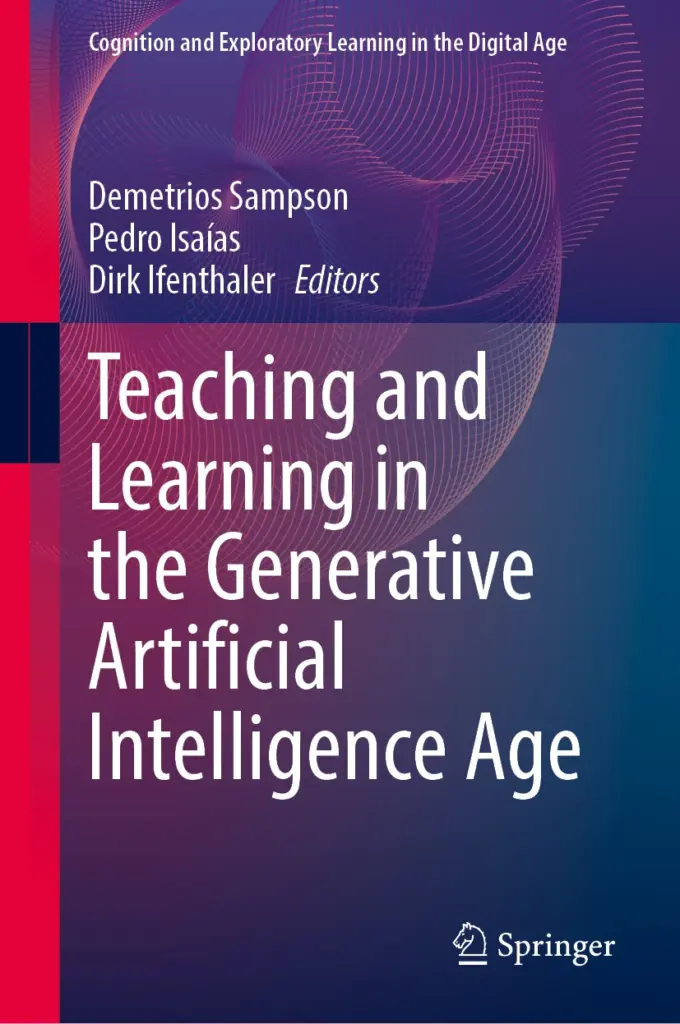
Teaching and Learning in the Generative Artificial Intelligence Age
This book brings together contributions from prominent researchers investigating the changes in teaching, learning, and assessment with and beyond generative artificial intelligence (GenAI). These chapters represent a variety of research themes and approaches, offering insights into how GenAI is adopted in different educational practices, identifying opportunities and challenges in this rapidly developing field. The volume extends selected presentations from the Cognition and Exploratory Learning in the Digital Age (CELDA 2024) conference, contributing valuable insights for educators, researchers, and policymakers navigating an increasingly AI-driven educational landscape.
Sampson, D. G., Isaias, P., & Ifenthaler, D. (Eds.). (2025). Teaching and learning in the generative artificial intelligence age. Springer. https://doi.org/10.1007/978-3-032-05817-1

Computer-Based Diagnostics and Systematic Analysis of Knowledge
This volume explores the rapidly advancing field of technology-supported knowledge assessment. Across academia, research on learning and instruction, AI-based analysis, psychology, and education, there is a pressing need for a comprehensive collection of foundations and methodologies related to knowledge. While the market offers books on individual and locally developed methods, a holistic overview is currently lacking. It aims to fill that gap, inspiring projects globally and benefiting knowledge-intensive developments in both digital and traditional learning environments. Understanding the state and processes of knowledge often poses a bottleneck in the quality of designs and implementations. This book addresses this challenge by focusing on mostly automated, easy-to-implement strategies, supporting the crucial task of understanding knowledge.
Pirnay-Dummer, P., & Ifenthaler, D. (Eds.). (2025). Computer-based diagnostics and systematic analysis of knowledge (Vol. 2). Springer. https://doi.org/10.1007/978-3-031-87740-7
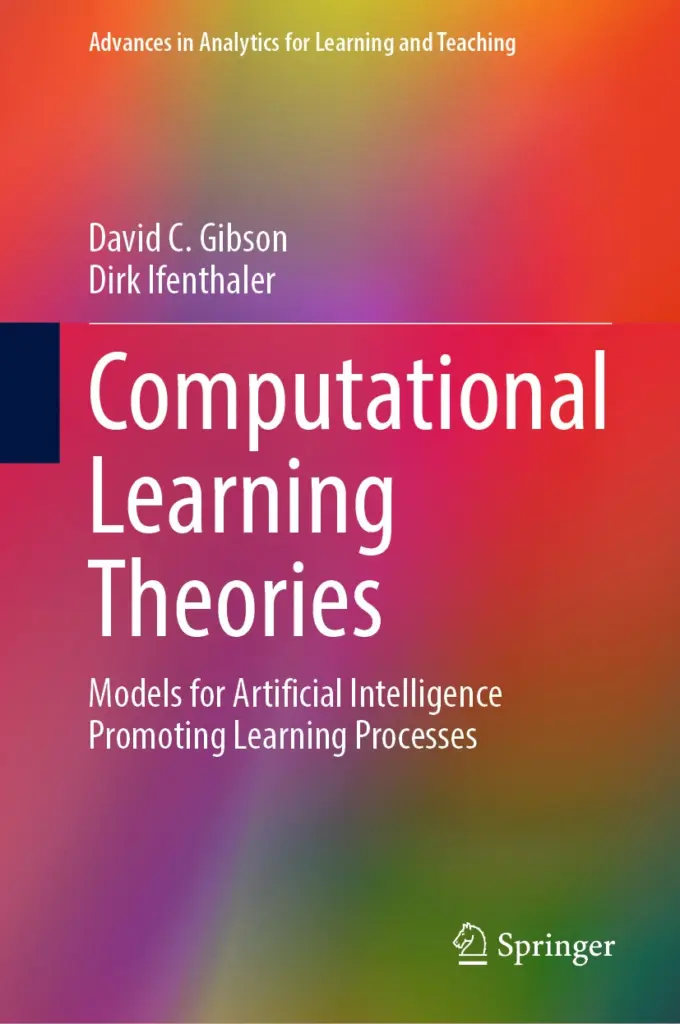
Computational Learning Theories
This book shows how artificial intelligence grounded in learning theories can promote individual learning, team productivity and multidisciplinary knowledge-building. It advances the learning sciences by integrating learning theory with computational biology and complexity, offering an updated mechanism of learning, which integrates previous theories, provides a basis for scaling from individuals to societies, and unifies models of psychology, sociology and cultural studies.
Gibson, D. C., & Ifenthaler, D. (2024). Computational learning theories. Models for artificial intelligence promoting learning processes. Springer. https://doi.org/10.1007/978-3-031-65898-3
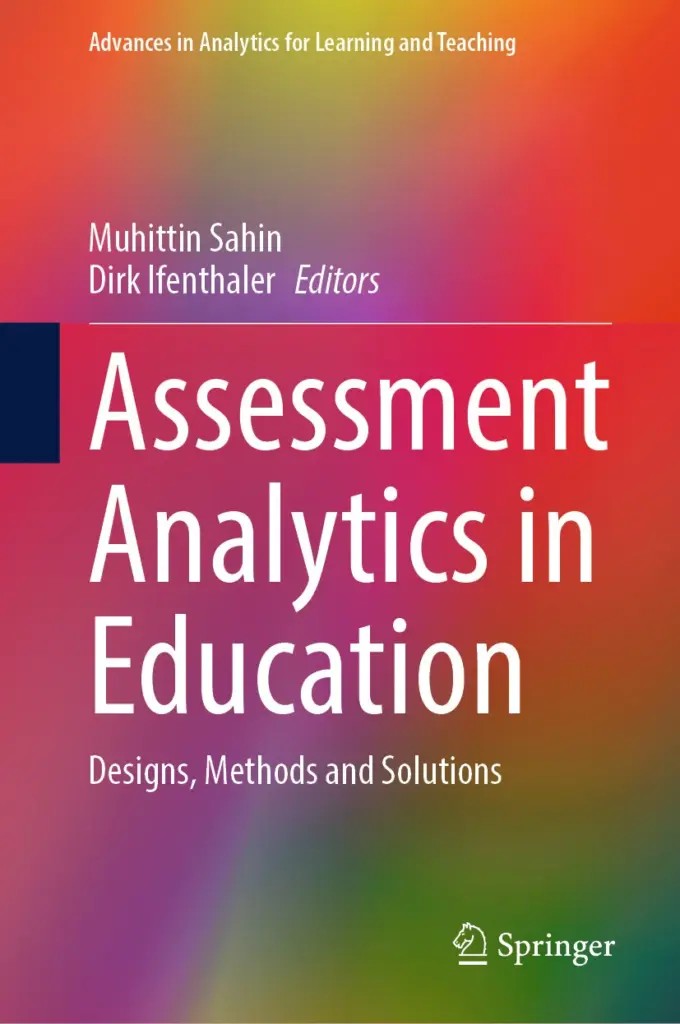
Assessment Analytics in Education
This book is about the current state of research in online assessment. The growth of this field is set to accelerate exponentially with emerging opportunities for automatic data collection and analysis. Yet, the future of online assessment faces major challenges including, perhaps most importantly, the extent to which assessments, when enabled by technology, can serve simultaneously the needs of learners, teachers and those of the enterprise of education.
Sahin, M., & Ifenthaler, D. (Eds.). (2024). Assessment analytics in education. Designs, methods and solutions. Springer. https://doi.org/10.1007/978-3-031-56365-2
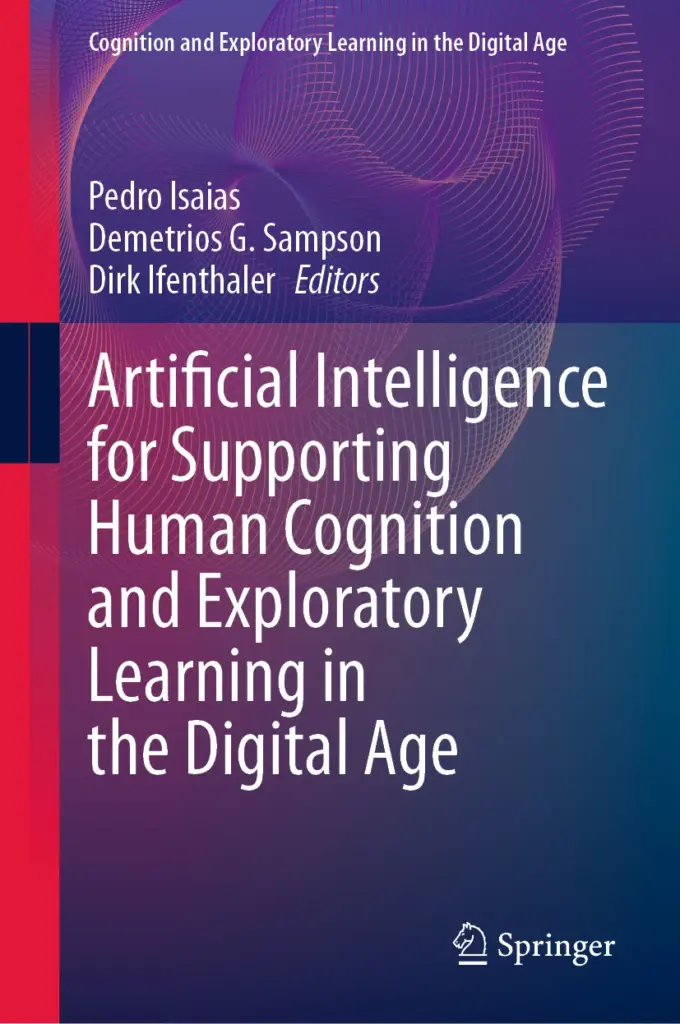
Artificial Intelligence for Supporting Human Cognition and Exploratory Learning in the Digital Age
The Cognition and Exploratory Learning in the Digital Age (CELDA) conference focuses on discussing and addressing the challenges pertaining to the evolution of the learning process, the role of pedagogical approaches and the progress of technological innovation, in the context of the digital age. In each edition, CELDA, gathers researchers and practitioners in an effort to cover both technological and pedagogical issues in ground-breaking studies. Some of CELDA’s main topics include: assessment of exploratory learning approaches and technologies, educational psychology, learning paradigms in academia and the corporate sector, student-centered learning and lifelong learning. The CELDA 2023 conference selected and published a selection of papers that focus on the use of Artificial Intelligence and Learning Analytics in the educational context.
Isaias, P., Sampson, D. G., & Ifenthaler, D. (Eds.). (2024). Artificial intelligence for supporting human cognition and exploratory learning in the digital age. Springer. https://doi.org/10.1007/978-3-031-66462-5
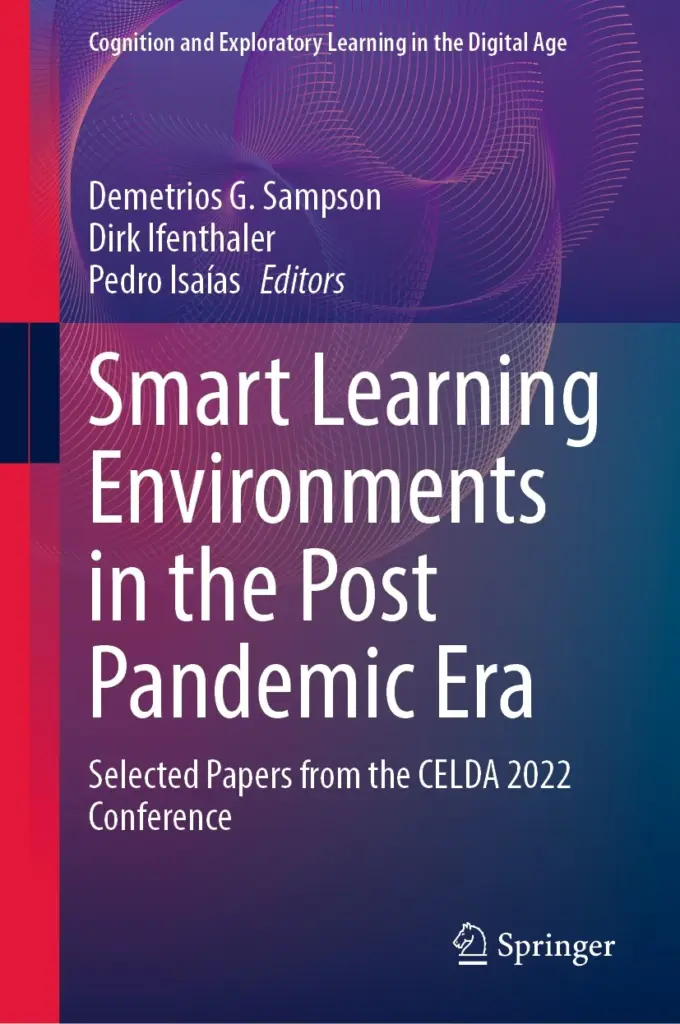
Smart Learning Environments in the Post Pandemic Era
This edited volume presents the latest research focussing on current challenges on the deployment of smart technologies and pedagogies for supporting teaching and learning in the post-covid19 era. This is at the core of studying the evolution of the learning process, the role of technology-supported pedagogical approaches, and the progress of educational technology innovations in the context of digital transformation in education and professional training.
Sampson, D. G., Ifenthaler, D., & Isaias, P. (Eds.). (2024). Smart learning environments in the post pandemic era. Springer. https://doi.org/10.1007/978-3-031-54207-7
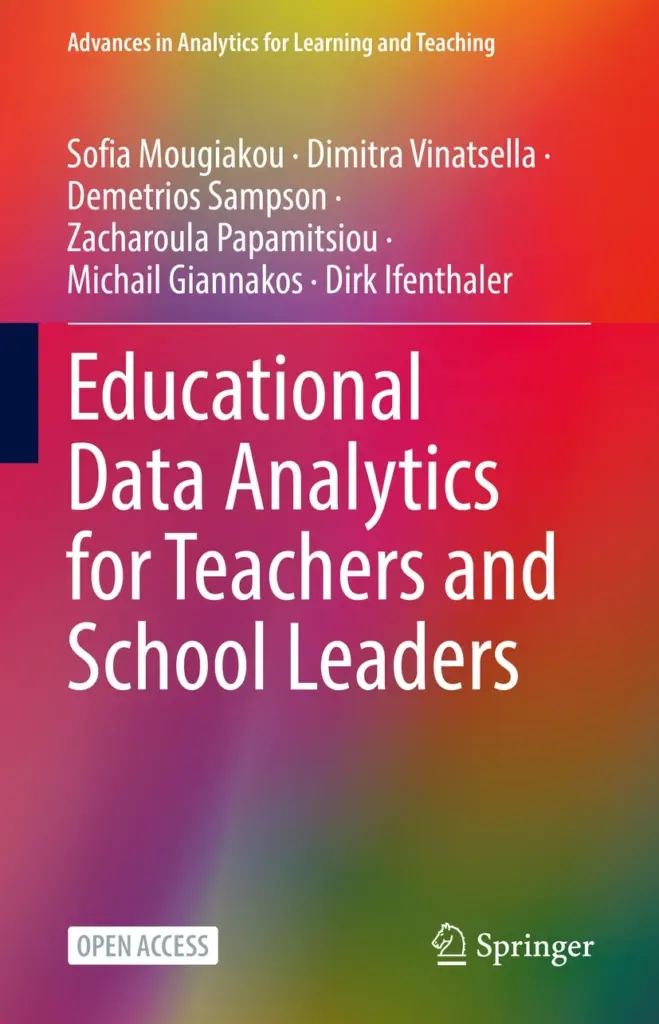
Educational Data Analytics for Teachers and School Leaders
Educational Data Analytics (EDA) have been attributed with significant benefits for enhancing on-demand personalized educational support of individual learners as well as reflective course (re)design for achieving more authentic teaching, learning and assessment experiences integrated into real work-oriented tasks.
This open access textbook is a tutorial for developing, practicing and self-assessing core competences on educational data analytics for digital teaching and learning. It combines theoretical knowledge on core issues related to collecting, analyzing, interpreting and using educational data, including ethics and privacy concerns. The textbook provides questions and teaching materials/ learning activities as quiz tests of multiple types of questions, added after each section, related to the topic studied or the video(s) referenced. These activities reproduce real-life contexts by using a suitable use case scenario (storytelling), encouraging learners to link theory with practice; self-assessed assignments enabling learners to apply their attained knowledge and acquired competences on EDL.
Mougiakou, S., Vinatsella, D., Sampson, D. G., Papamitsiou, Z., Giannakos, M., & Ifenthaler, D. (2023). Educational data analytics for teachers and school leaders. Springer. https://doi.org/10.1007/978-3-031-15266-5
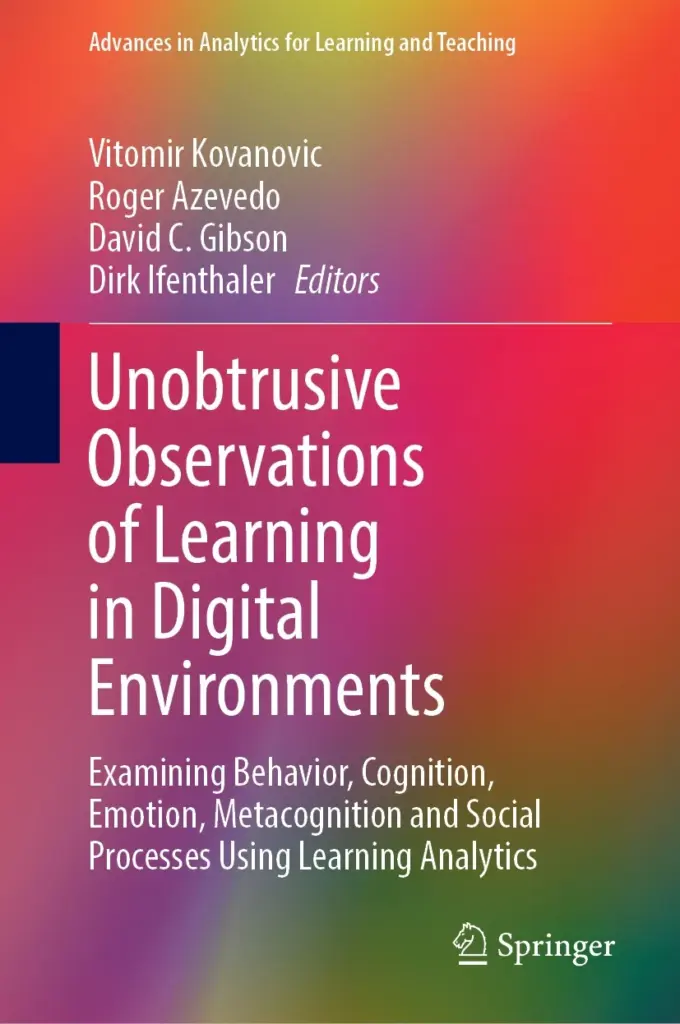
Unobtrusive Observations of Learning in Digital Environments
This book integrates foundational ideas from psychology, immersive digital learning environments supported by theories and methods of the learning sciences, particularly in pursuit of questions of cognition, behavior and emotion factors in digital learning experiences. New and emerging foundations of theory and analysis based on observation of digital traces are enhanced by data science, particularly machine learning, with extensions to deep learning, natural language processing and artificial intelligence brought into service to better understand higher-order thinking capacities such as self-regulation, collaborative problem-solving and social construction of knowledge.
Kovanovic, V., Azevedo, R., Gibson, D. C., & Ifenthaler, D. (Eds.). (2023). Unobtrusive observations of learning in digital environments. Examining behavior, cognition, emotion, metacognition and social processes using learning analytics. Springer. https://doi.org/10.1007/978-3-031-30992-2
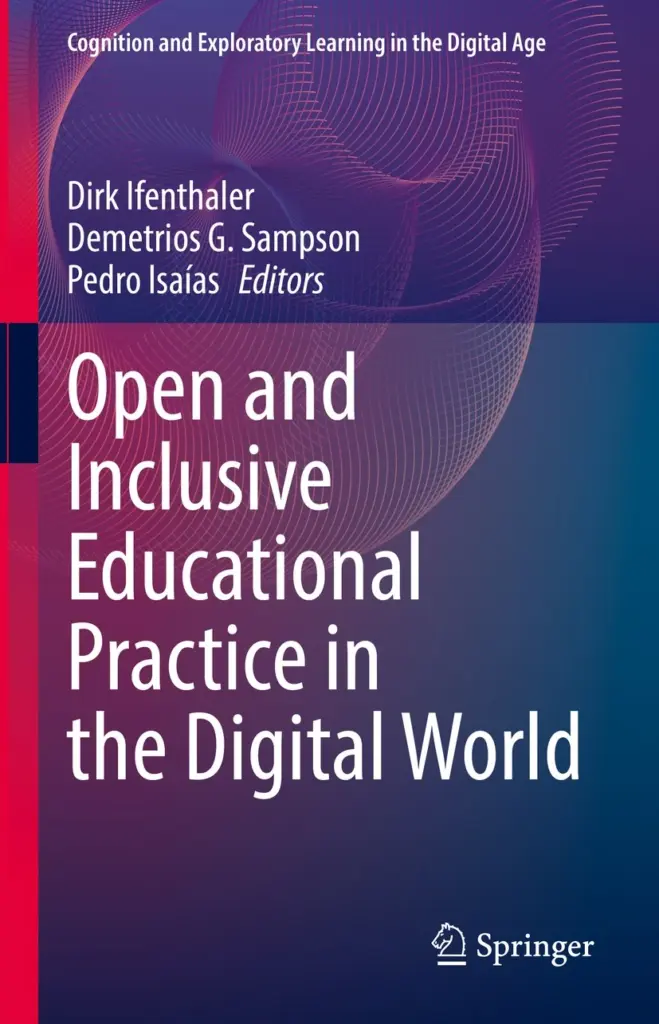
Open and Inclusive Educational Practice in the Digital World
The book covers a wide array of topics examining the deployment of learning technologies, proposing pedagogical approaches and practices to address digital transformation, presenting case studies of specific technologies and contexts and overall debating the contribution of learning technologies for the improvement of the learning process and the experience of students and for the development of key competences. It represents the best work reported during CELDA 2021, comprising expanded peer reviewed chapters from best papers focusing on open education models, inclusive learning environments and adaptive as well as personalized learning support.
Ifenthaler, D., Sampson, D. G., & Isaias, P. (Eds.). (2023). Open and inclusive educational practice in the digital world. Springer. https://doi.org/10.1007/978-3-031-18512-0
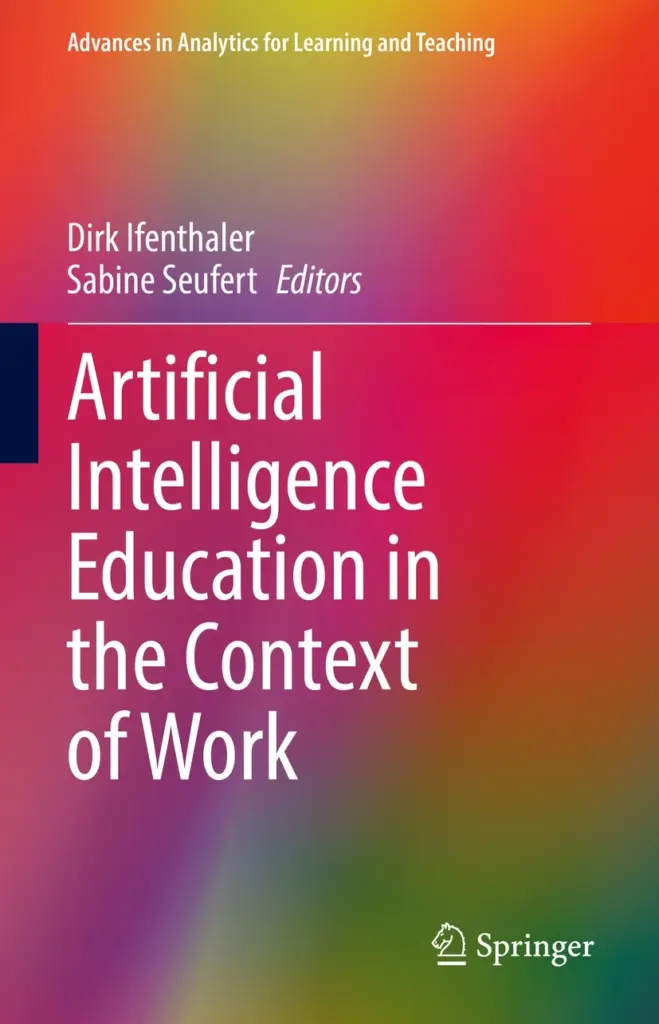
Artificial Intelligence Education in the Context of Work
This edited volume remedies existing deficiencies in the literature on artificial intelligence and education in the context of work. The topics addressed by this book are:
• Supporting formal and informal learning through AI
• Human-machine collaboration for learning at the workplace, including the potential of human-AI interaction in professional and vocational education contexts, design, use, and evaluation of human-AI hybrid systems for learning
Ifenthaler, D., & Seufert, S. (Eds.). (2022). Articifial intelligence education in the context of work. Springer. https://doi.org/10.1007/978-3-031-14489-9
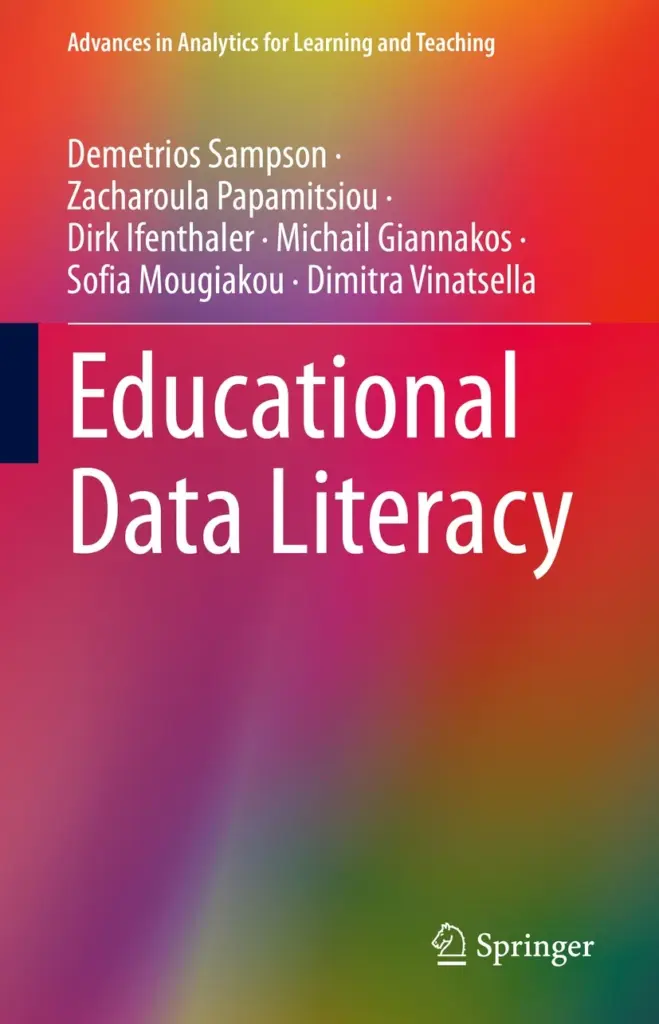
Educational Data Literacy
Digital Education is recognised as a key transformative innovation for K-12 school and university teaching and learning, as well as, for professional development and vocational training. As a result, blended and online courses are nowadays widely deployed to meet the needs of K-12, higher education and vocational training students, as well as, the needs for professional development of in-service professionals. In this context, important professional roles in digital education and training, such as, the Instructional Designers, who design and develop online and blended courses, and the Trainers or Tutors who support the delivery of these online and blended courses, require new professional competences compared to those assumed at the traditional face to face education and tra ining programs.
Sampson, D. G., Papamitsiou, Z., Ifenthaler, D., Giannakos, M., Mougiakou, S., & Vinatsella, D. (2022). Educational data literacy. Springer. https://doi.org/10.1007/978-3-031-11705-3
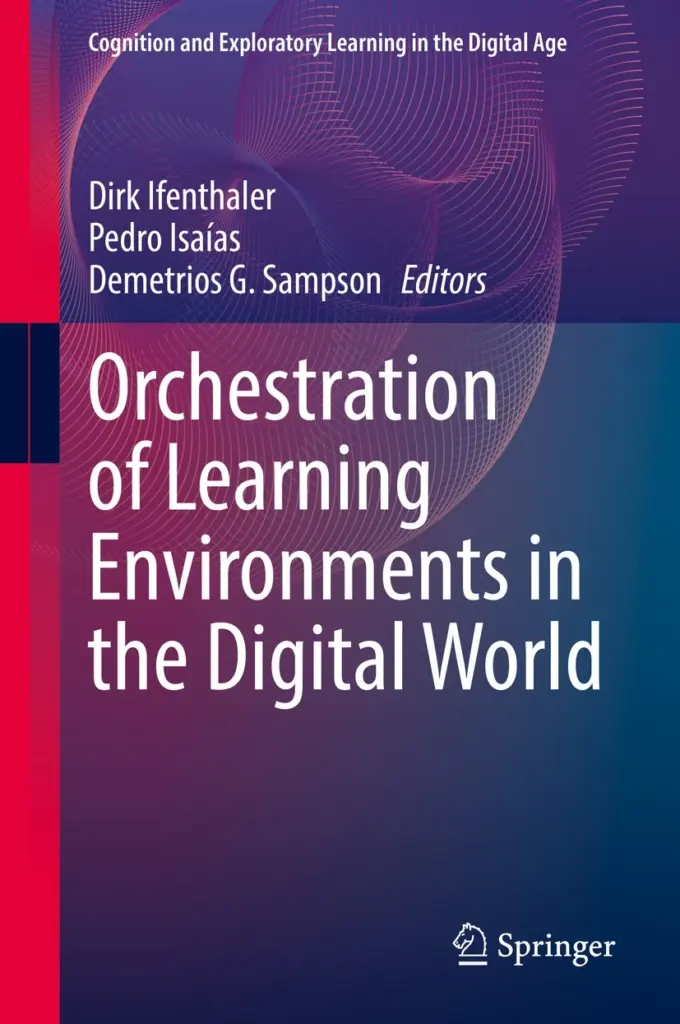
Orchestration of Learning Environments in the Digital World
This volume focuses on the implications of digital technologies for educators and educational decision makers that are not widely represented in the literature. The chapters contained in the volume are based on the presentations at the 2020 edition of the CELDA conference and cover multiple developments in the field such as deploying learning technologies, proposing pedagogical approaches and practices to address digital transformation, and presenting case studies of specific technologies and contexts. The chapters form a lively debate and provide a comprehensive analysis of the contribution of learning technologies designed to improve the learning process and the experience of the students as well as to develop key competences.
Ifenthaler, D., Isaias, P., & Sampson, D. G. (Eds.). (2022). Orchestration of learning environments in the digital world. Springer. https://doi.org/10.1007/978-3-030-90944-4
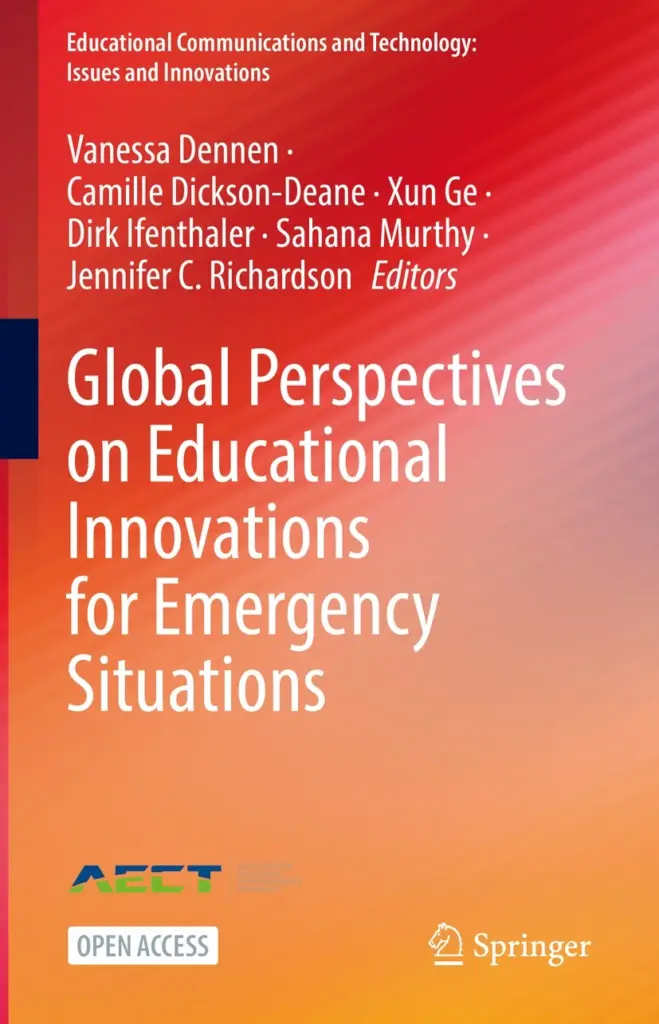
Global Perspectives on Educational Innovations for Emergency Situations
This open access book focuses on making the transition from in-person, classroom education to other feasible alternative modes and methodologies to deliver education at all levels. The book presents and analyzes research questions to explore in this arena, including pedagogical issues relating to technological and infrastructure challenges, teacher professional development, issues of disparity, access and equity, and impact of government policies on education. It also provides unique opportunities and vehicles for generating scholarship that helps explain the varied educational needs, perspectives and solutions that arise during an emergency and the different roles educational institutions and educators may play during this time.
Dennen, V., Dickson-Deane, C., Ge, X., Ifenthaler, D., Murthy, S., & Richardson, J. C. (Eds.). (2022). Global perspectives on educational innovations for emergency situations. Springer. https://doi.org/10.1007/978-3-030-99634-5
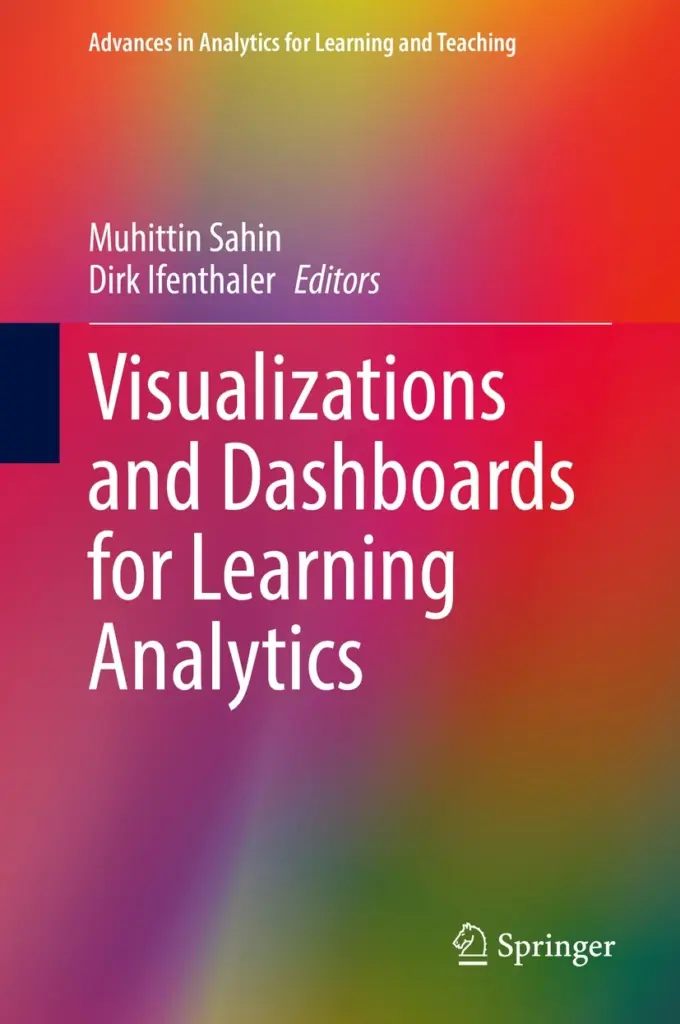
Visualizations and Dashboards for Learning Analytics
This edited volume fills the gaps in existing literature on visualization and dashboard design for learning analytics. To do so, it presents critical tips to stakeholders and acts as guide to efficient implementation. The book covers the following topics: visualization and dashboard design for learning analytics, visualization and dashboard preferences of stakeholders, learners’ patterns on the dashboard, usability of visualization techniques and the dashboard, dashboard and intervention design, learning and instructional design for learning analytics, privacy and security issues about the dashboard, and future directions of visualization and dashboard design.
Sahin, M., & Ifenthaler, D. (Eds.). (2021). Visualizations and dashboards for learning analytics. Springer. https://doi.org/10.1007/978-3-030-81222-5
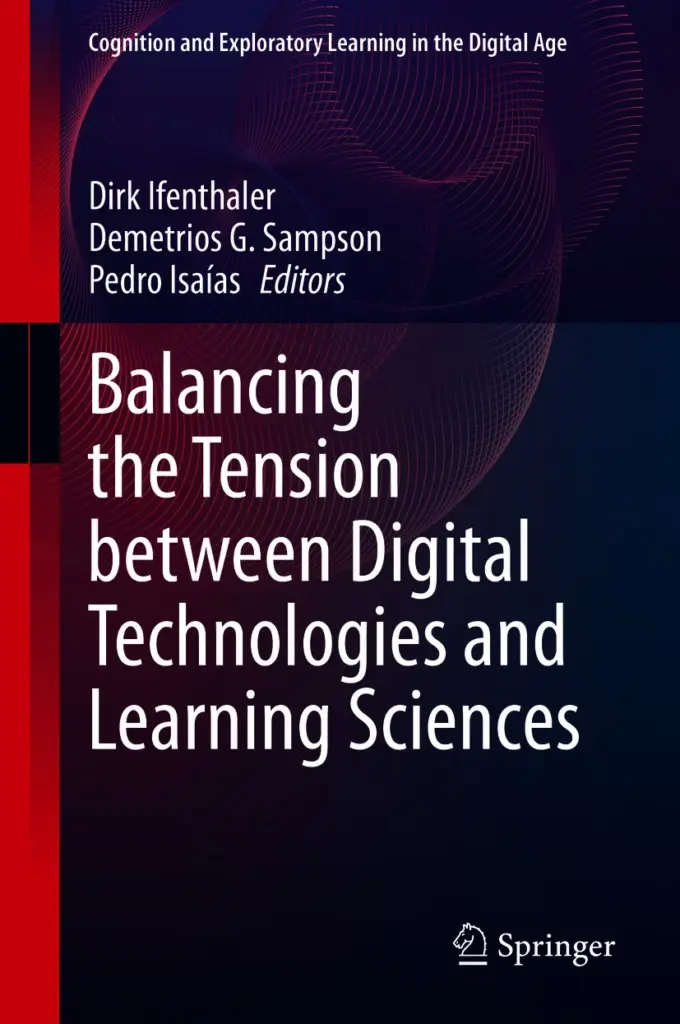
Balancing the Tension between Digital Technologies and Learning Sciences
This volume focuses on the implications of digital technologies for educators and educational decision makers that is not widely represented in the literature. While there are many volumes on how one might integrate a particular technology, there are no volumes on how digital technologies can or should be exploited to address the needs and propel the benefits of large-scale teaching, learning and assessment.
Ifenthaler, D., Sampson, D. G., & Isaias, P. (Eds.). (2021). Balancing the tension between digital technologies and learning sciences. Springer. https://doi.org/10.1007/978-3-030-65657-7

Game-based Learning Across the Disciplines
The volume focuses on epistemological, theoretical and empirical issues of game-based learning in various disciplines. It encompasses questions of game design as well as instructional integration and organizational implementation of game-based learning across various disciplines and includes contributions from different levels of the formal educational system (i.e., primary, secondary and tertiary education) as well as contributions reporting the use of game-based learning in informal learning settings. The volume addresses scholars, practitioners and students who are interested in how games and game-based learning can be designed, implemented and evaluated in a cross-, inter- and transdisciplinary perspective.
Aprea, C., & Ifenthaler, D. (Eds.). (2021). Game-based learning across the disciplines. Springer. https://doi.org/10.1007/978-3-030-75142-5

Digital Transformation of Learning Organizations
This open access volume provides insight into how organizations change through the adoption of digital technologies. Opportunities and challenges for individuals as well as the organization are addressed. It features four major themes: 1. Current research exploring the theoretical underpinnings of digital transformation of organizations. 2. Insights into available digital technologies as well as organizational requirements for technology adoption. 3. Issues and challenges for designing and implementing digital transformation in learning organizations. 4. Case studies, empirical research findings, and examples from organizations which successfully adopted digital workplace learning.
Ifenthaler, D., Hofhues, S., Egloffstein, M., & Helbig, C. (Eds.). (2021). Digital transformation of learning organizations. Springer. https://doi.org/10.1007/978-3-030-55878-9

Adoption of Data Analytics in Higher Education Learning and Teaching
The book aims to advance global knowledge and practice in applying data science to transform higher education learning and teaching to improve personalization, access and effectiveness of education for all. Currently, higher education institutions and involved stakeholders can derive multiple benefits from educational data mining and learning analytics by using different data analytics strategies to produce summative, real-time, and predictive or prescriptive insights and recommendations. Educational data mining refers to the process of extracting useful information out of a large collection of complex educational datasets while learning analytics emphasizes insights and responses to real-time learning processes based on educational information from digital learning environments, administrative systems, and social platforms.
Ifenthaler, D., & Gibson, D. C. (Eds.). (2020). Adoption of data analytics in higher education learning and teaching. Springer. https://doi.org/10.1007/978-3-030-47392-1
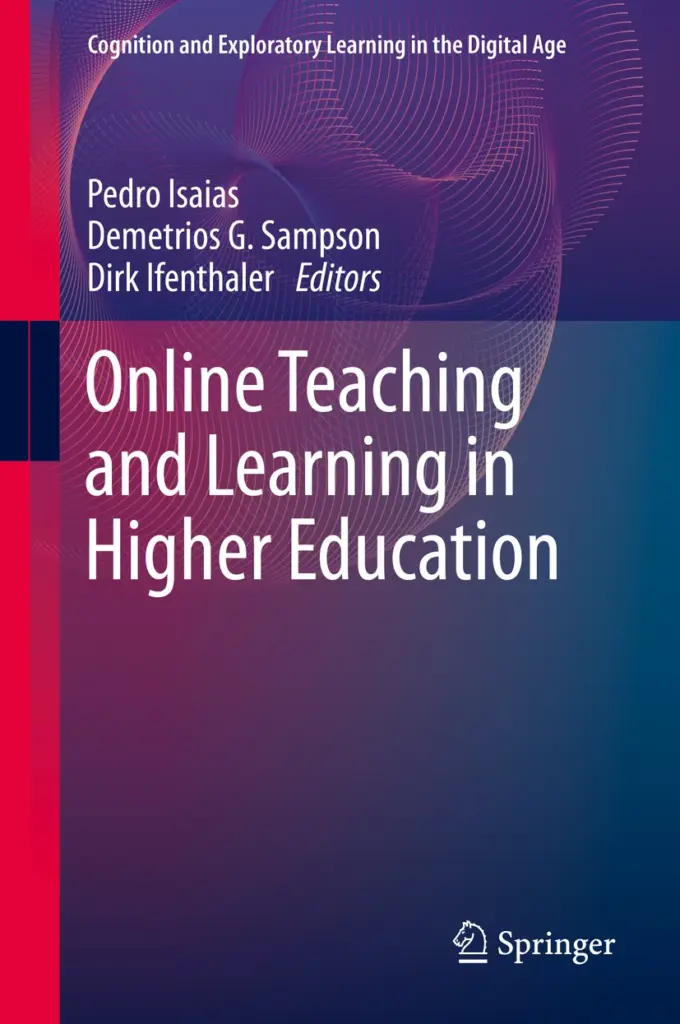
Online Teaching and Learning in Higher Education
This book is to explores a variety of facets of online learning environments to understand how learning occurs and succeeds in digital contexts and what teaching strategies and technologies are most suited to this format. Business, health, government and education are some of the core sectors of society which have been experiencing deep transformations due to a generalized digitalization. While these changes are not novel, the swift progress of technology and the rising complexity of digital environments place a focus on the need for further research and novel strategies.
Isaias, P., Sampson, D. G., & Ifenthaler, D. (Eds.). (2020). Online teaching and learning in higher education. Springer. https://doi.org/10.1007/978-3-030-48190-2
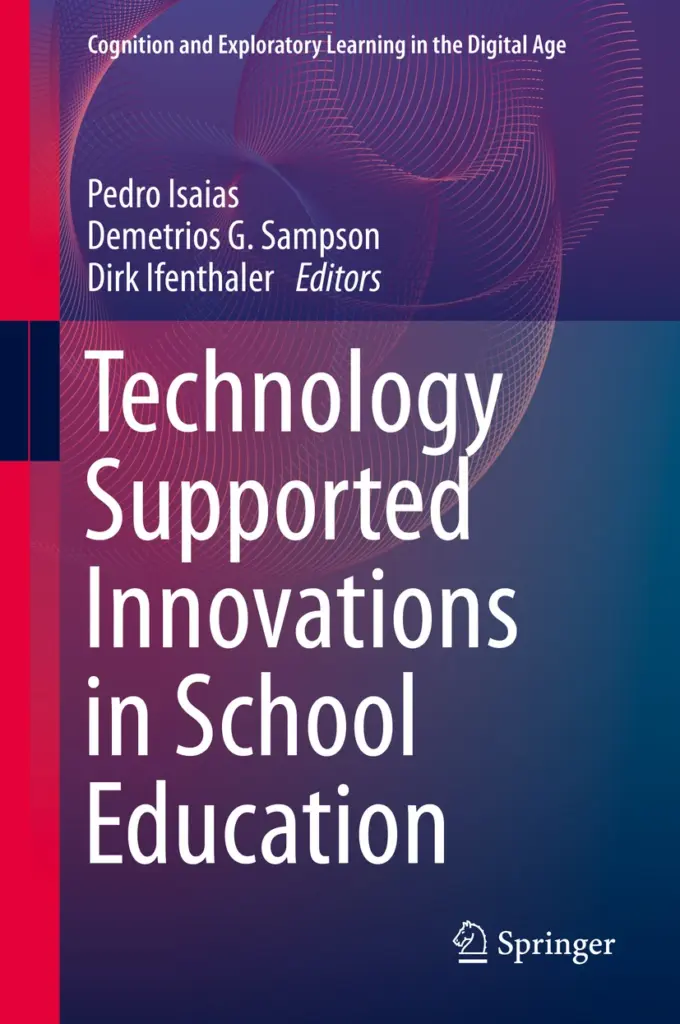
Technology Supported Innovations in School Education
This volume provides a comprehensive and contemporary depiction of the swift evolution of learning technologies and the innovations that derive from their deployment in school education. It comprises cases studies, research focused on emergent technologies and experiments with existing tools in a wide range of scenarios. The studies included in this volume explore the conceptual and practical aspects of technologies that are used to support learning, with a multidisciplinary approach that encompasses all levels of education.
Isaias, P., Sampson, D. G., & Ifenthaler, D. (Eds.). (2020). Technology supported innovations in school education. Springer. https://doi.org/10.1007/978-3-030-48194-0
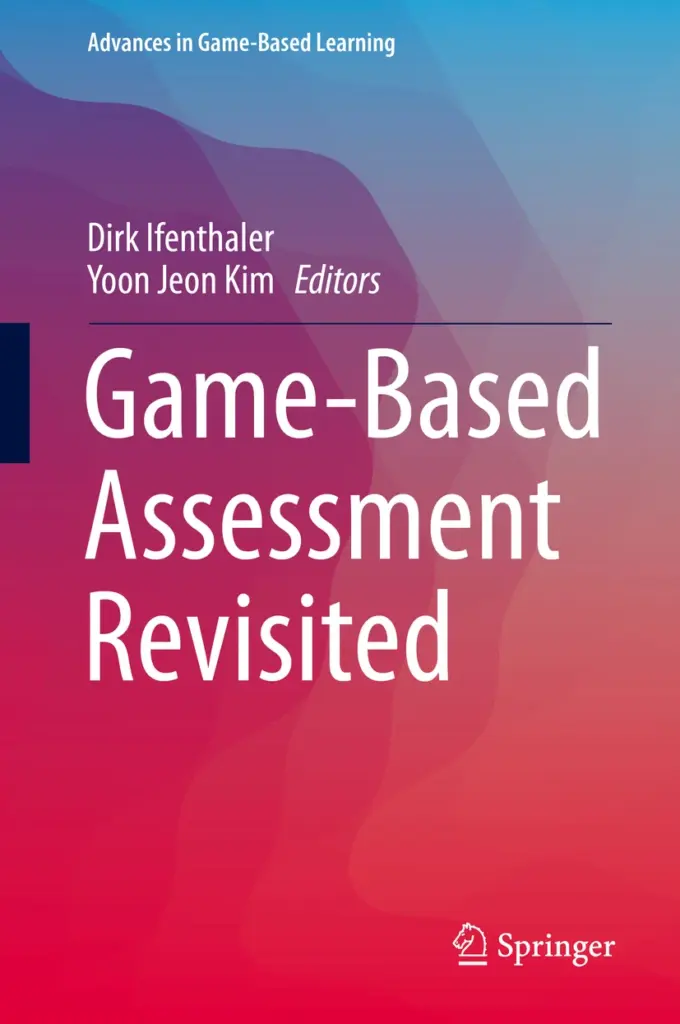
Game-Based Assessment Revisited
The capabilities and possibilities of emerging game-based learning technologies bring about a new perspective of learning and instruction. This, in turn, necessitates alternative ways to assess the kinds of learning that are taking place in the game-based environments. The field has been broadening the focus of assessment in game environments (i.e., what we measure), developing processes and methodologies that go beyond psychometrics practices (i.e., how we go about assessment in games), and implementing the game-based assessment (GBA) in real contexts. The current state of the field calls for a revisit of this topic to understand what we have learned from the research on this topic, and how the GBA work changed how the field thinks about assessment beyond game environments.
Ifenthaler, D., & Kim, Y. J. (Eds.). (2019). Game-based assessment revisted. Springer. https://doi.org/10.1007/978-3-030-15569-8

Learning Technologies for Transforming Large-Scale Teaching, Learning, and Assessment
The book showcases how emerging educational technologies and innovative practices have been used to address core global educational challenges. It provides state-of-the-art insights and case studies of exploiting innovative learning technologies, including Massive Open Online Courses and educational data analytics, to address key global challenges spanning from online Teacher Education to large-scale coding competence development.
Sampson, D. G., Spector, J. M., Ifenthaler, D., Isaias, P., & Sergis, S. (Eds.). (2019). Learning technologies for transforming teaching, learning and assessment at large scale. Springer. https://doi.org/10.1007/978-3-030-15130-0
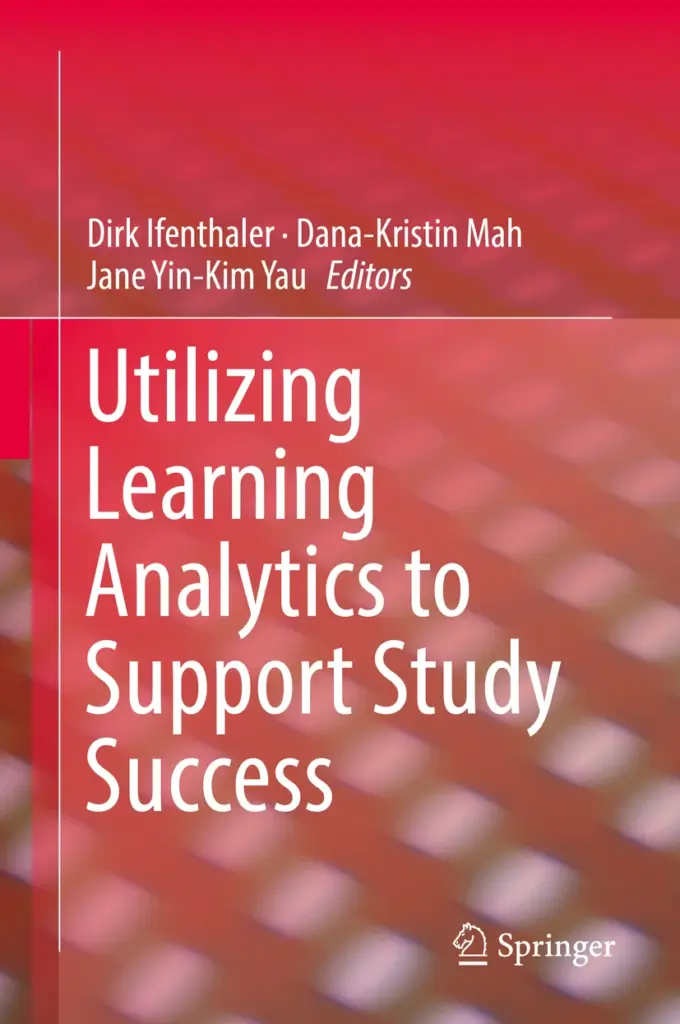
Utilizing Learning Analytics to Support Study Success
Utilizing Learning Analytics to Support Study Success ably exemplifies how educational data and innovative digital technologies contribute to successful learning and teaching scenarios and provides critical insight to researchers, graduate students, teachers, and administrators in the general areas of education, educational psychology, academic and organizational development, and instructional technology.
Ifenthaler, D., Yau, J. Y.-K., & Mah, D.-K. (Eds.). (2019). Utilizing learning analytics to support study success. Springer. https://doi.org/10.1007/978-3-319-64792-0
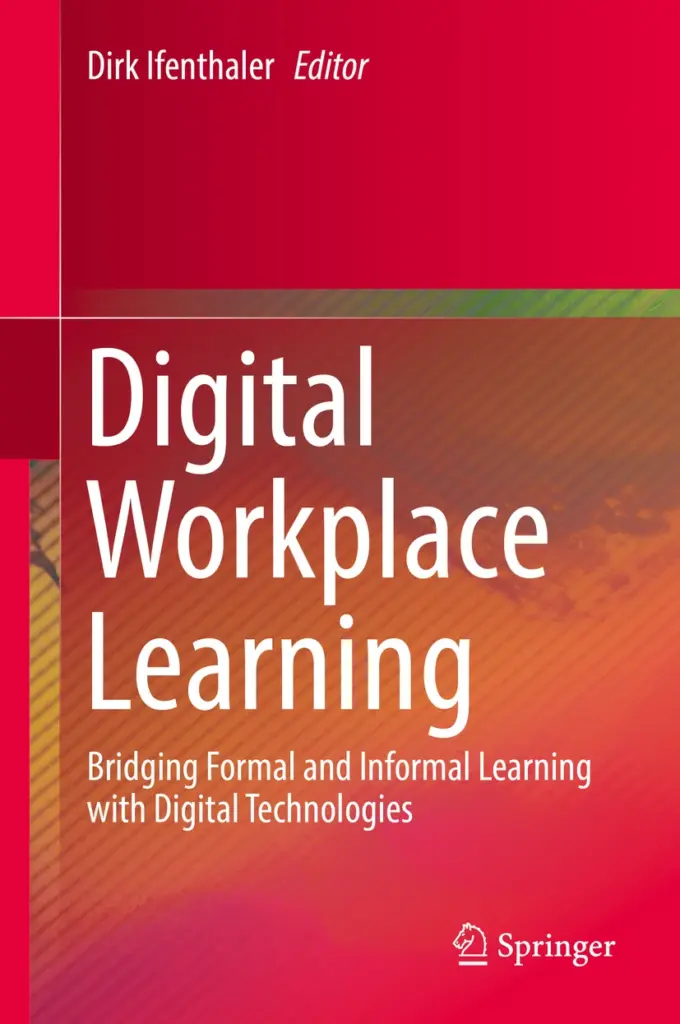
Digital Workplace Learning
This book aims to provide insight into how digital technologies may bridge and enhance formal and informal workplace learning. It features four major themes: 1. Current research exploring the theoretical underpinnings of digital workplace learning. 2. Insights into available digital technologies as well as organizational requirements for technology-enhanced learning in the workplace. 3. Issues and challenges for designing and implementing digital workplace learning as well as strategies for assessments of learning in the workplace. 4. Case studies, empirical research findings, and innovative examples from organizations which successfully adopted digital workplace learning.
Ifenthaler, D. (Ed.). (2018). Digital workplace learning. Bridging formal and informal learning with digital technologies. Springer. https://doi.org/10.1007/978-3-319-46215-8
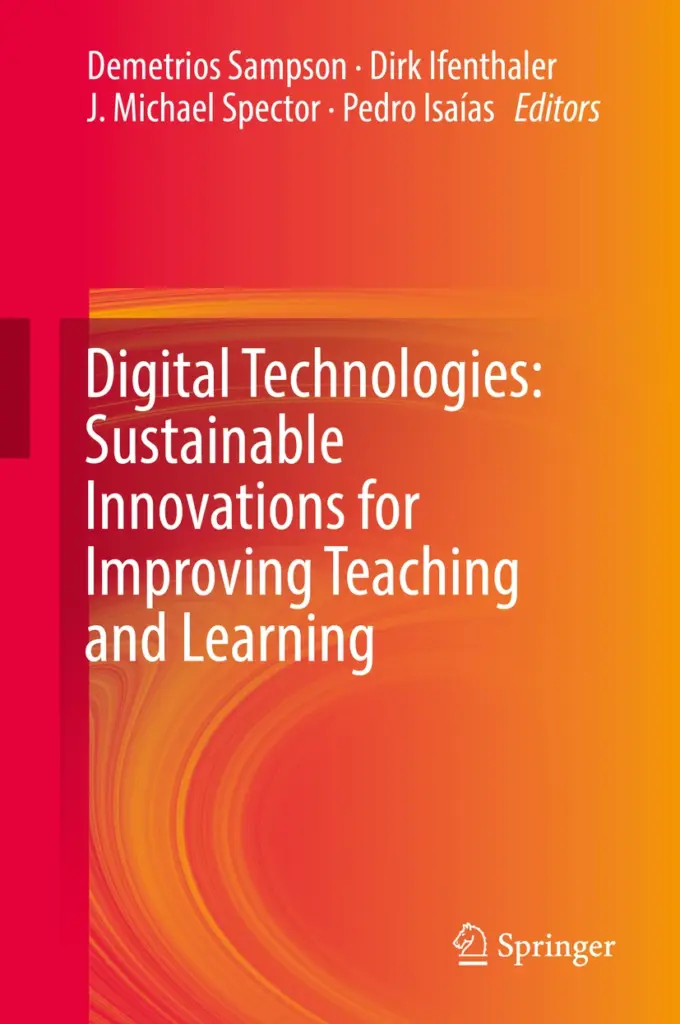
Digital Technologies: Sustainable Innovations for Improving Teaching and Learning
The aim of this volume entitled Digital Technologies: Sustainable Innovations for improving Teaching and Learning is to contribute in the global discussion on digital technologies as the means to foster sustainable educational innovations for improving the teaching, learning and assessment from K-12 to Higher Education. It compiles papers presented at the CELDA (Cognition and Exploratory Learning in the Digital Age) conference, which has as its goal continuing to address these challenges and promote the effective use of new tools and technologies to support teaching, learning and assessment.
Sampson, D. G., Ifenthaler, D., Spector, J. M., & Isaias, P. (Eds.). (2018). Digital technologies: Sustainable innovations for improving teaching and learning. Springer. https://doi.org/10.1007/978-3-319-73417-0
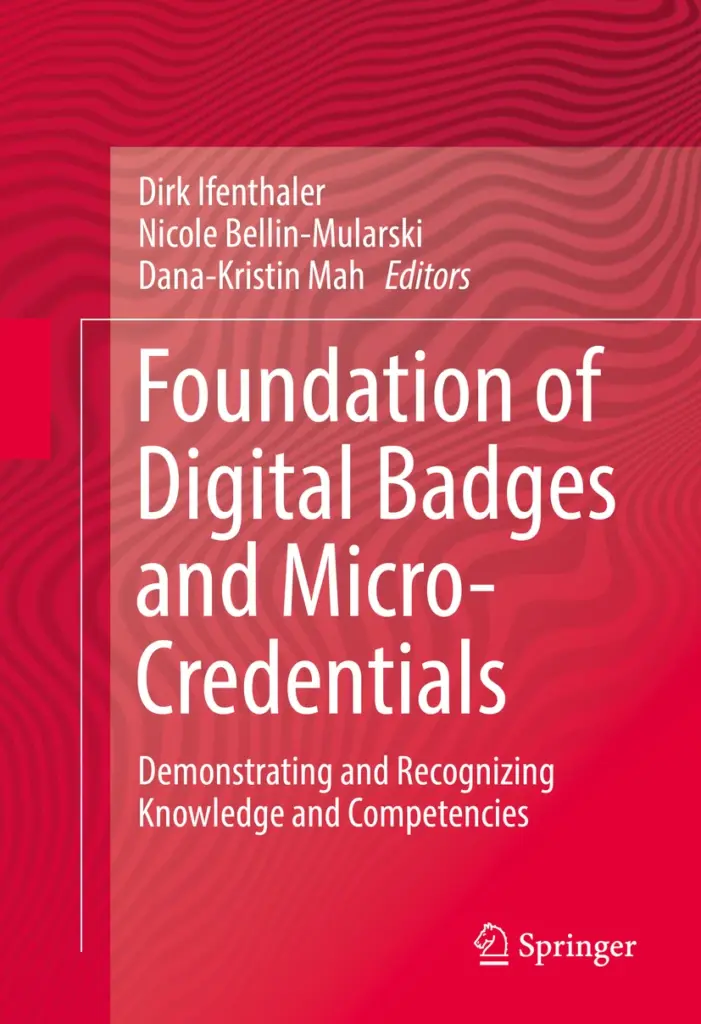
Foundation of Digital Badges and Micro-Credentials
This edited volume provides insight into how digital badges may enhance formal, non-formal and informal education by focusing on technical design issues including organizational requirements, learning and instructional design, as well as deployment. It features current research exploring the theoretical foundation and empirical evidence of the utilization of digital badges as well as case studies that describe current practices and experiences in the use of digital badges for motivation, learning, and instruction in K-12, higher education, workplace learning, and further education settings.
Ifenthaler, D., Bellin-Mularski, N., & Mah, D.-K. (Eds.). (2016). Foundations of digital badges and micro-credentials. Springer. https://doi.org/10.1007/978-3-319-15425-1
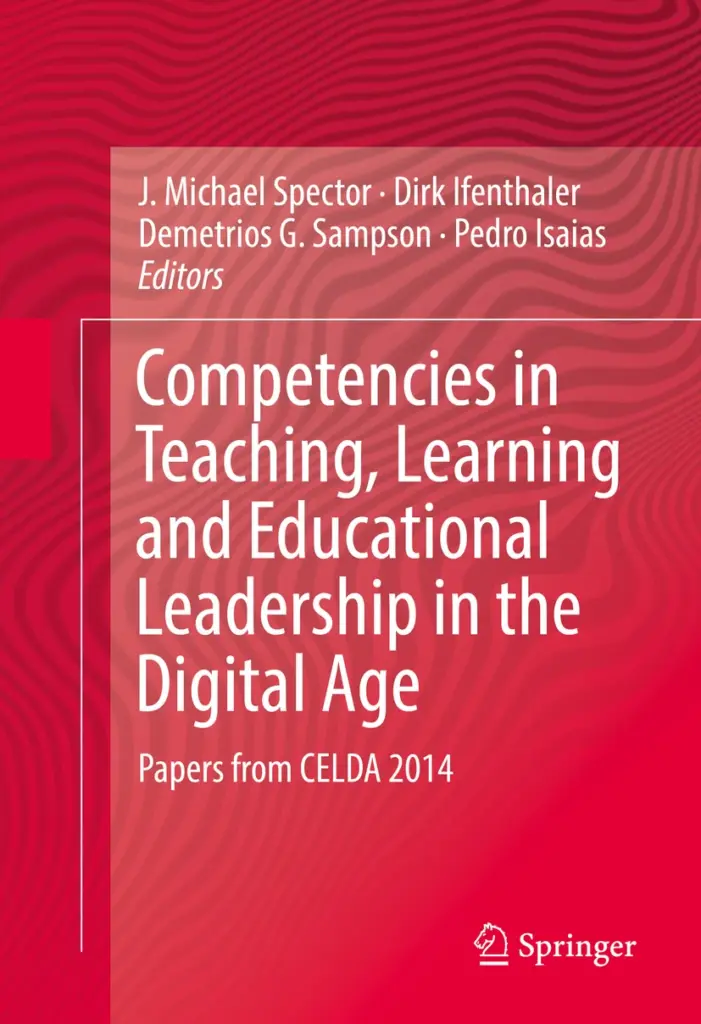
Competencies in Teaching, Learning and Educational Leadership in the Digital Age
This book makes a contribution to a global conversation about the competencies, challenges, and changes being introduced as a result of digital technologies. This volume consists of four parts, with the first being elaborated from each of the featured panelists at CELDA (Cognition and Exploratory Learning in the Digital Age) 2014.
Spector, J. M., Ifenthaler, D., Sampson, D. G., & Isaias, P. (Eds.). (2016). Competencies in teaching, learning and educational leadership in the digital age. Springer. https://doi.org/10.1007/978-3-319-30295-9
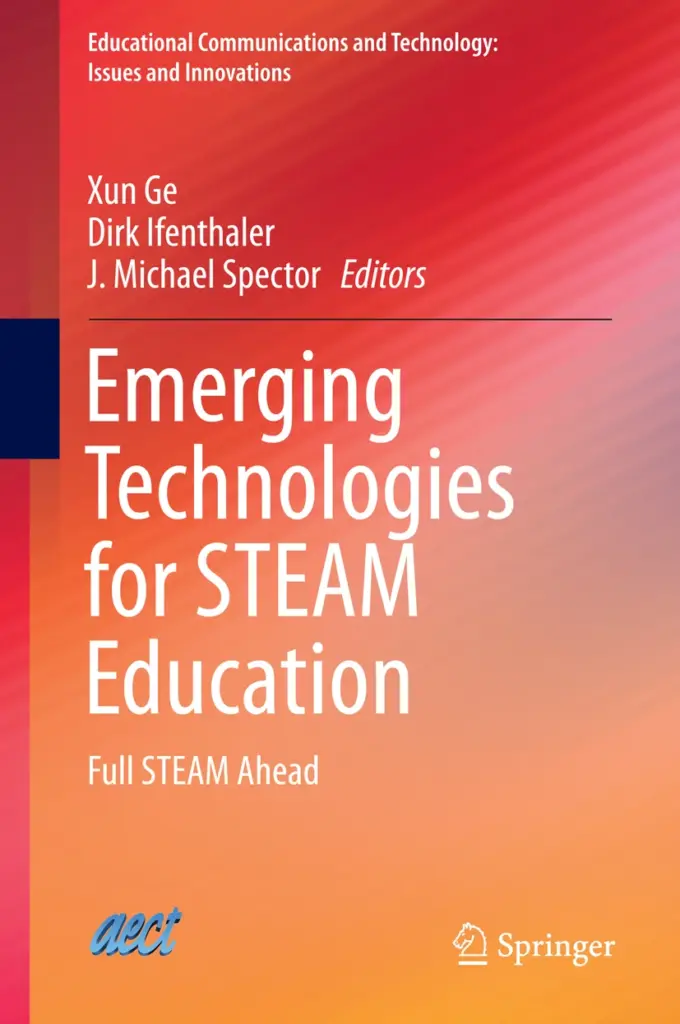
Emerging Technologies for STEAM Education
This theory-to-practice guide offers leading-edge ideas for wide-scale curriculum reform in sciences, technology, engineering, the arts, and mathematics–the STEAM subjects. Chapters emphasize the critical importance of current and emerging digital technologies in bringing STEM education up to speed and implementing changes to curricula at the classroom level. Of particular interest are the diverse ways of integrating the liberal arts into STEM course content in mutually reshaping humanities education and scientific education.
Ge, X., Ifenthaler, D., & Spector, J. M. (Eds.). (2015). Emerging technologies for STEAM education: Full STEAM ahead. Springer. https://doi.org/10.1007/978-3-319-02573-5
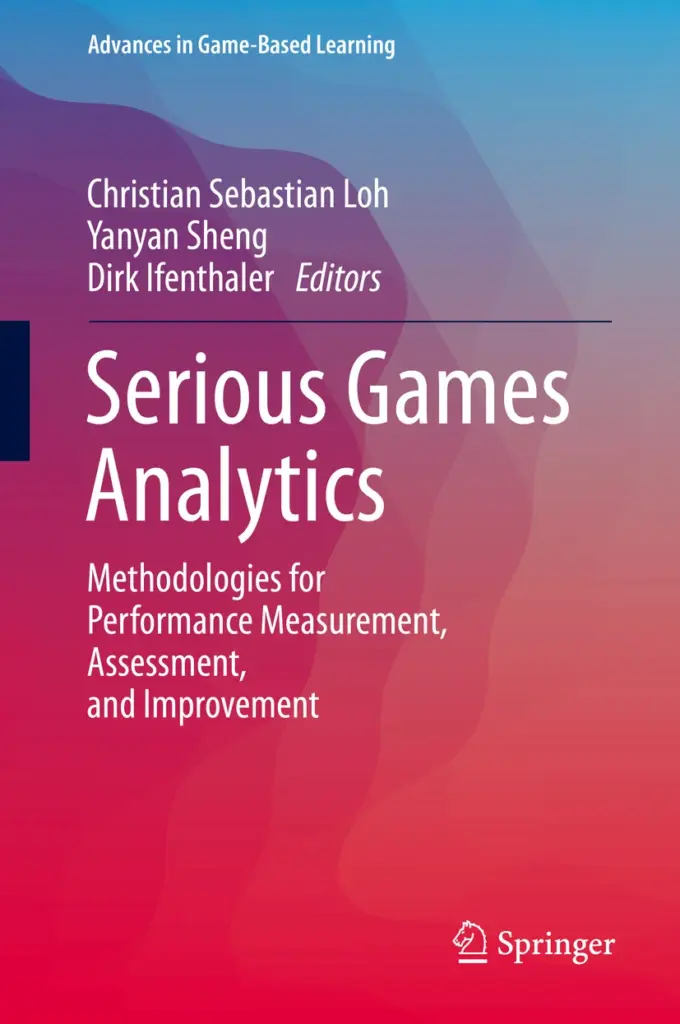
Serious Games Analytics
Serious games is an emerging field where the games are created using sound learning theories and instructional design principles to maximize learning and training success. But how would stakeholders know what play-learners have done in the game environment, and if the actions performance brings about learning? Could they be playing the game for fun, really learning with evidence of performance improvement, or simply gaming the system, i.e., finding loopholes to fake that they are making progress? This volume endeavors to answer these questions.
Loh, C. S., Sheng, Y., & Ifenthaler, D. (Eds.). (2015). Serious games analytics. methodologies for performance measurement, assessment, and improvement. Springer. https://doi.org/10.1007/978-3-319-05834-4
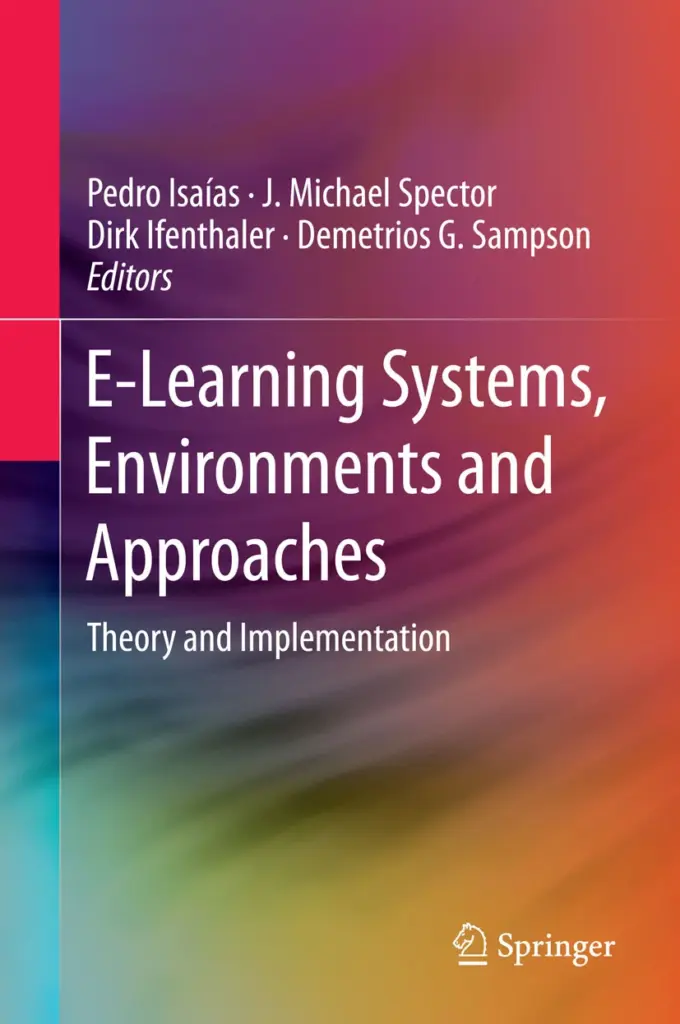
E-Learning Systems, Environments and Approaches
E-Learning has been, since its initial stages, a synonym for flexibility. While this dynamic nature has mainly been associated with time and space it is safe to argue that currently it embraces other aspects such as the learners’ profile, the scope of subjects that can be taught electronically and the technology it employs. New technologies also widen the range of activities and skills developed in e-Learning. Electronic learning environments have evolved past the exclusive delivery of knowledge. Technology has endowed e-Learning with the possibility of remotely fomenting problem solving skills, critical thinking and team work, by investing in information exchange, collaboration, personalisation and community building.
Isaias, P., Spector, J. M., Ifenthaler, D., & Sampson, D. G. (Eds.). (2015). E-Learning systems, environments and approaches. Springer. https://doi.org/10.1007/978-3-319-05825-2

Digital Systems for Open Access to Formal and Informal Learning
Today, Digital Systems and Services for Technology Supported Learning and Education are recognized as the key drivers to transform the way that individuals, groups and organizations “learn” and the way to “assess learning” in 21st Century. These transformations influence: Objectives – moving from acquiring new “knowledge” to developing new and relevant “competences”; Methods – moving from “classroom” based teaching to “context-aware” personalized learning; and Assessment – moving from “life-long” degrees and certifications to “on-demand” and “in-context” accreditation of qualifications.
Sampson, D. G., Ifenthaler, D., Spector, J. M., & Isaias, P. (Eds.). (2014). Digital systems for open access to formal and informal learning. Springer. https://doi.org/10.1007/978-3-319-02264-2
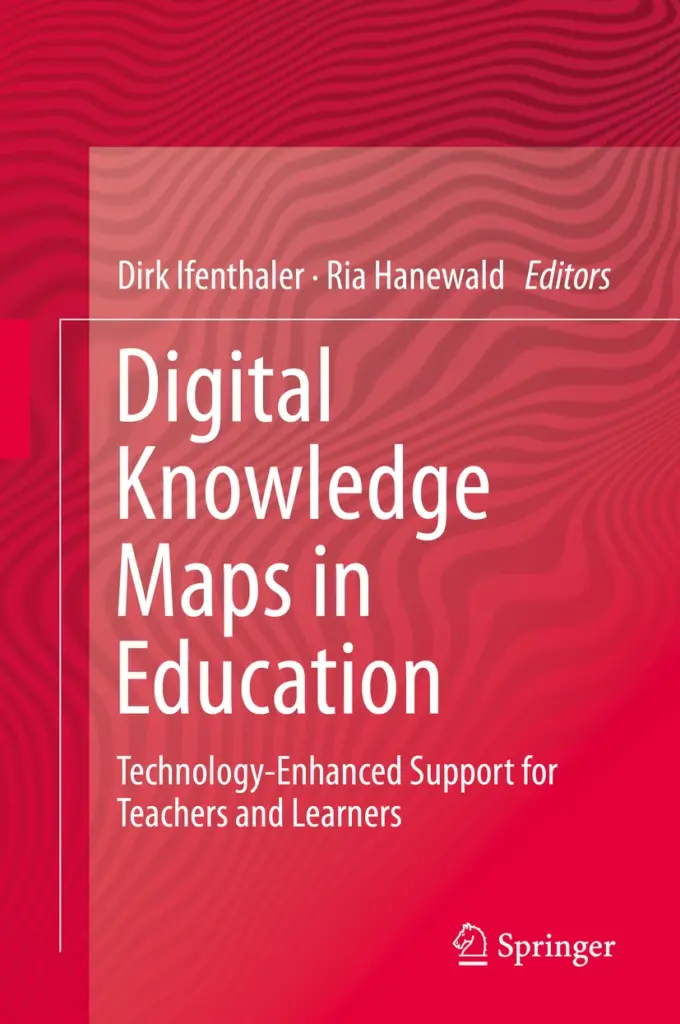
Digital Knowledge Maps in Education
Digital knowledge maps are ‘at a glance’ visual representations that enable enriching, imaginative and transformative ways for teaching and learning, with the potential to enhance positive educational outcomes. The use of such maps has generated much attention and interest among tertiary education practitioners and researchers over the last few years as higher education institutions around the world begin to invest heavily into new technologies designed to provide online spaces within which to build resources and conduct activities.
Ifenthaler, D., & Hanewald, R. (Eds.). (2014). Digital knowledge maps in education. Technology enhanced support for teachers and learners. Springer. https://doi.org/10.1007/978-1-4614-3178-7
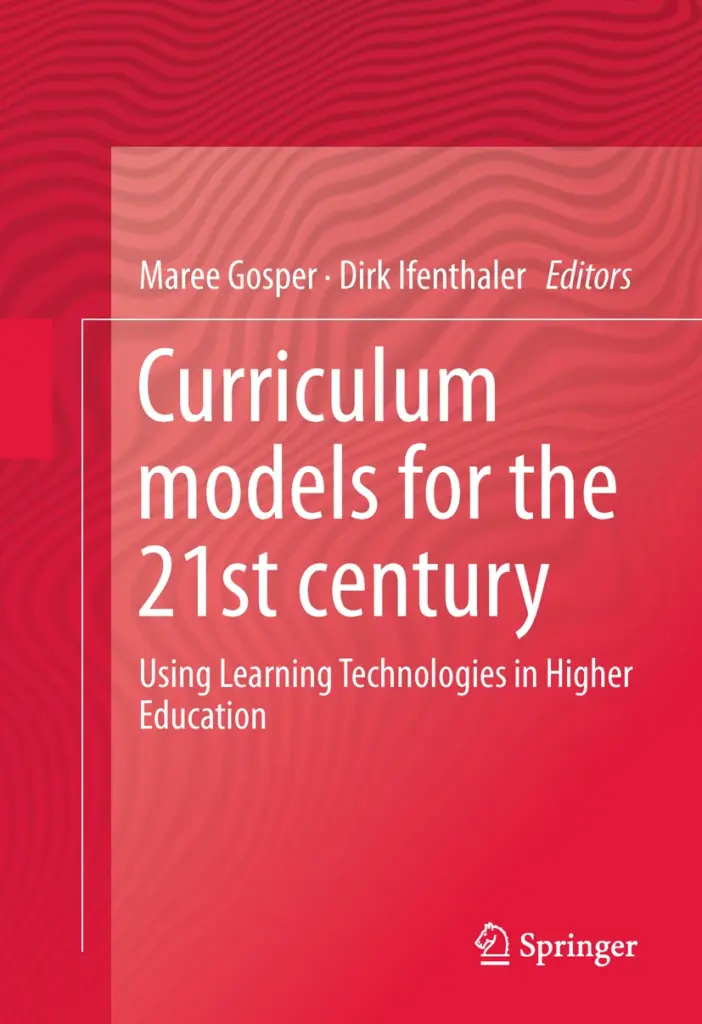
Curriculum Models for the 21st Century
Changing student profiles and the increasing availability of mainstream and specialized learning technologies are stretching the traditional face-to-face models of teaching and learning in higher education. Institutions, too, are facing far-reaching systemic changes which are placing strains on existing resources and physical infrastructure and calling into question traditional ways of teaching through lectures and tutorials. And, with an ever-increasing scrutiny on teaching and teachers’ accountability for positive educational outcomes, the call for closer attention to learning, teaching and, most especially, to the design and delivery of the curriculum is given increasing relevance and importance.
Gosper, M., & Ifenthaler, D. (Eds.). (2014). Curriculum models for the 21st Century. Using learning technologies in higher education. Springer. https://doi.org/10.1007/978-1-4614-7366-4

Ubiquitous and Mobile Learning in the Digital Age
This edited volume focuses on Ubiquitous and Mobile Informal and Formal Learning in the Digital Age, with subtopics: Mobile and Ubiquitous Informal and Formal Learning Environments (Part I), Social Web Technologies for new knowledge representation, retrieval, creation and sharing in Informal and Formal Educational Settings (Part II), Virtual Worlds and Game-based Informal and Formal Learning (Part III), Location‐based and Context‐ Aware Environments for Formal and Informal Learning Integration (Part IV).
Sampson, D. G., Isaias, P., Ifenthaler, D., & Spector, J. M. (Eds.). (2013). Ubiquitous and mobile learning in the digital age. Springer. https://doi.org/10.1007/978-1-4614-3329-3
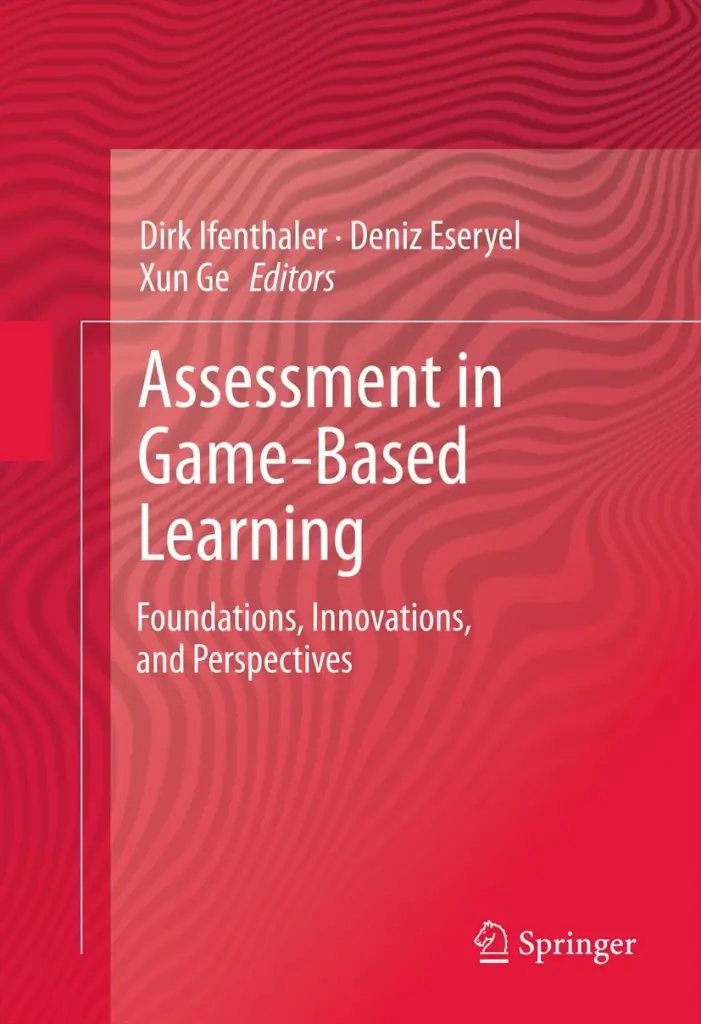
Assessment in Game-Based Learning
The capabilities and possibilities of emerging game-based learning technologies bring about a new perspective of learning and instruction. This, in turn, necessitates alternative ways to assess the kinds of learning that is taking place in the virtual worlds or informal settings. accordingly, aligning learning and assessment is the core for creating a favorable and effective learning environment.
Ifenthaler, D., Eseryel, D., & Ge, X. (Eds.). (2012). Assessment in game-based learning. Foundations, innovations, and perspectives. Springer. https://doi.org/10.1007/978-1-4614-3546-4
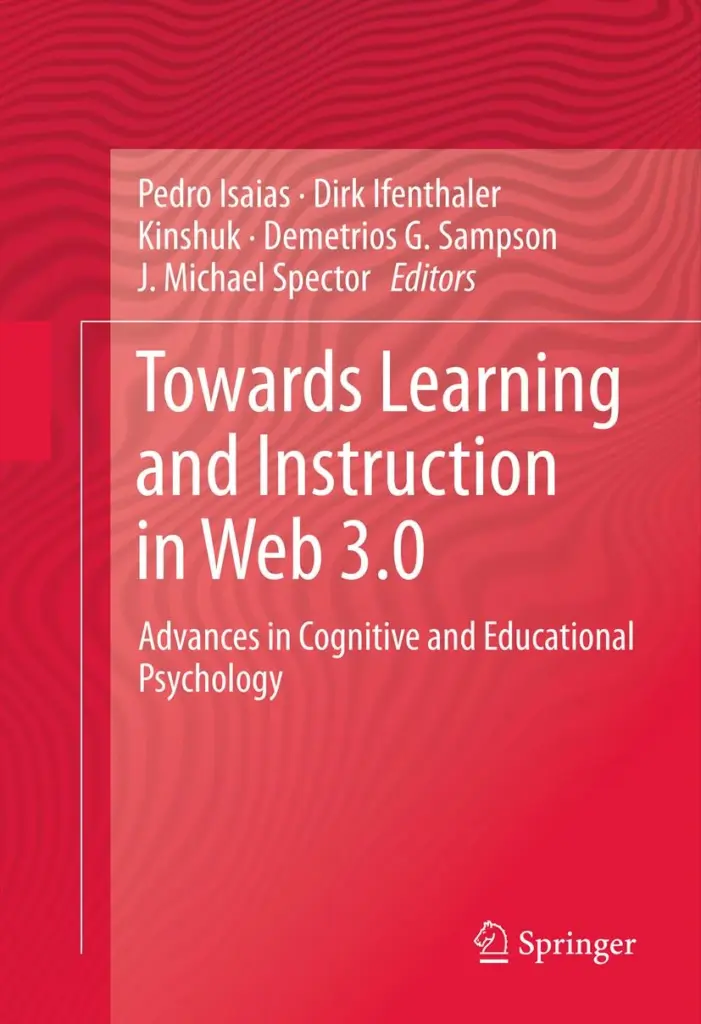
Towards Learning and Instruction in Web 3.0
The convergence of these two disciplines continues to increase and in turn, affects the academic and professional spheres in numerous ways. Towards Learning and Instruction in Web 3.0 addresses paradigms such as just-in-time learning, constructivism, student-centered learning and collaborative approaches which have emerged and are being supported by technological advancements such as simulations,virtual reality and multi-agents systems.
Isaias, P., Ifenthaler, D., Kinshuk, Sampson, D. G., & Spector, J. M. (Eds.). (2012). Towards learning and instruction in Web 3.0. Advances in cognitive and educational psychology. Springer. https://doi.org/10.1007/978-1-4614-1539-8
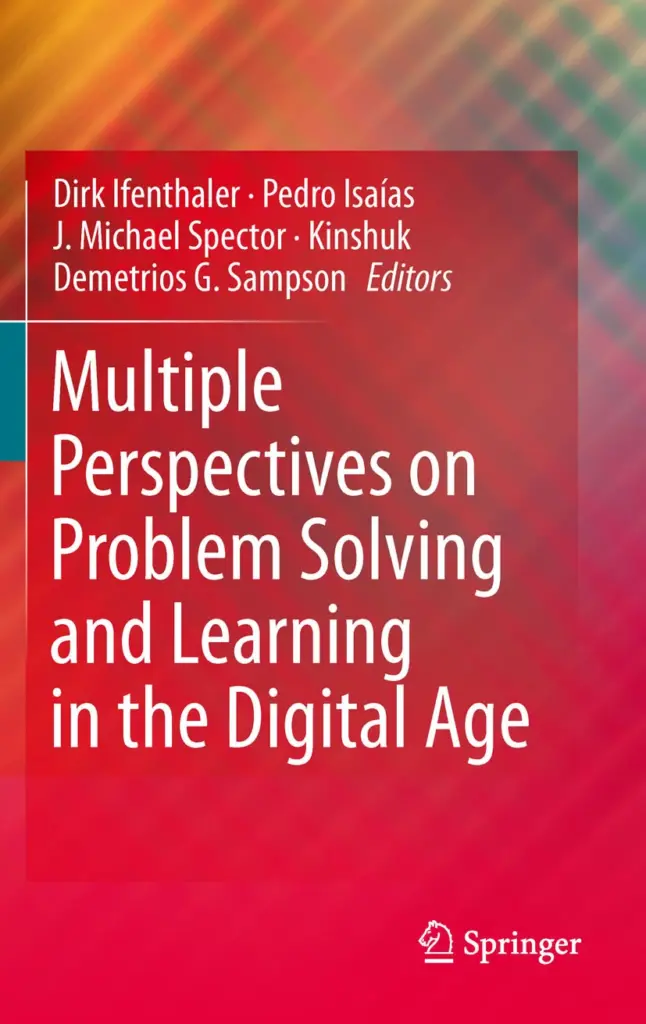
Multiple Perspectives on Problem Solving and Learning in the Digital Age
There have been advances in both cognitive psychology and computing that have affected the educational arena. The convergence of these two disciplines is increasing at a fast pace and affecting academia and professional practice in many ways. Paradigms such as just-in-time learning, constructivism, student-centered learning and collaborative approaches have emerged and are being supported by technological advancements such as simulations, virtual reality and multi-agents systems. These developments have created both opportunities and areas of serious concerns.
Ifenthaler, D., Kinshuk, Isaias, P., Sampson, D. G., & Spector, J. M. (Eds.). (2011). Multiple perspectives on problem solving and learning in the digital age. Springer. https://doi.org/10.1007/978-1-4419-7612-3
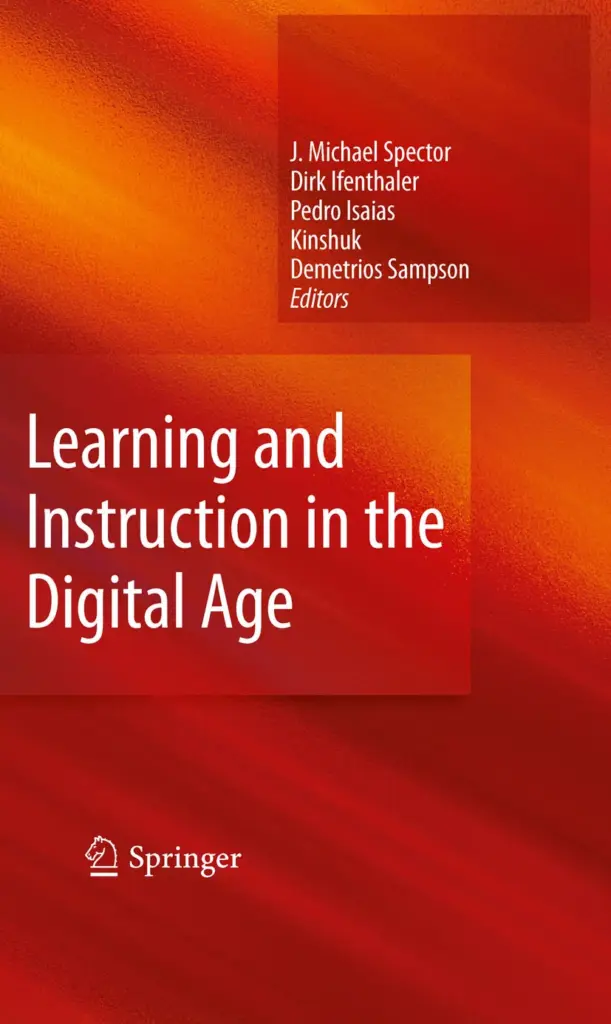
Learning and Instruction in the Digital Age
Instruction tailored to the individual student, learning and teaching outside the limits of time and space—ideas that were once considered science fiction are now educational reality, with the prospect of an intelligent Web 3.0 not far distant. Learning and Instruction in the Digital Age nimbly balances the technological and pedagogical aspects of these rapid changes, gathering papers from noted researchers on a wealth of topics relating to cognitive approaches to learning and teaching, mental models, online learning, communications, and innovative educational technologies.
Spector, J. M., Ifenthaler, D., Isaias, P., Kinshuk, & Sampson, D. G. (Eds.). (2010). Learning and instruction in the digital age. Springer. https://doi.org/10.1007/978-1-4419-1551-1

Computer-Based Diagnostics and Systematic Analysis of Knowledge
What is knowledge? How can it be successfully assessed? How can we best use the results? As questions such as these continue to be discussed and the learning sciences continue to deal with expanding amounts of data, the challenge of applying theory to diagnostic methods takes on more complexity.
Ifenthaler, D., Pirnay-Dummer, P., & Seel, N. M. (Eds.). (2010). Computer-based diagnostics and systematic analysis of knowledge. Springer. https://doi.org/10.1007/978-1-4419-5662-0
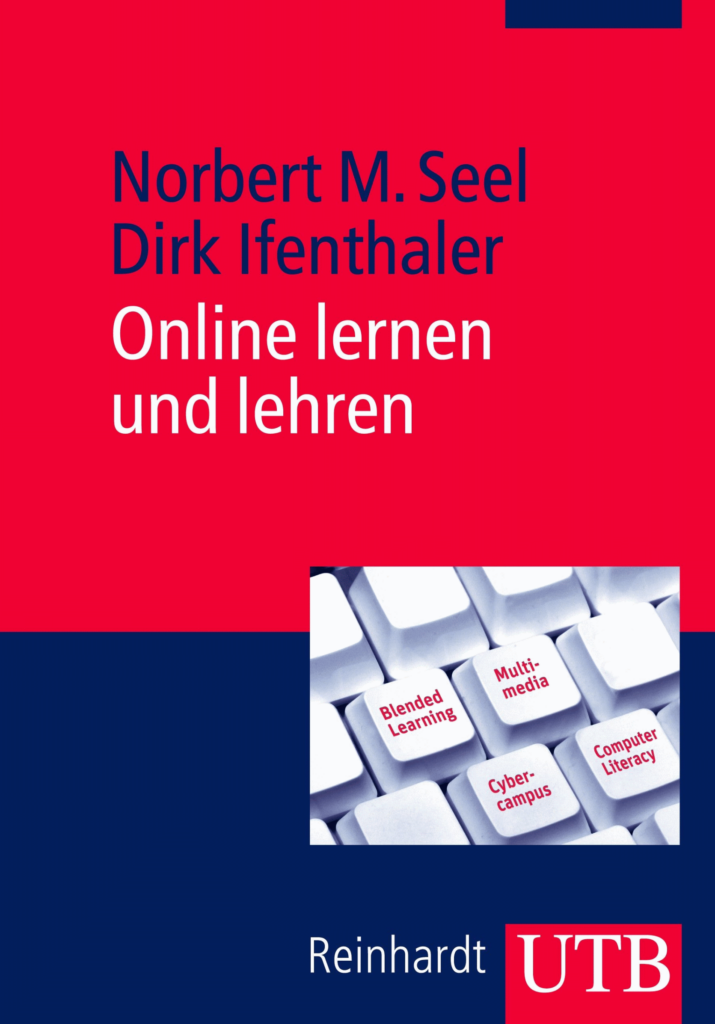
Online lernen und lehren
Wie kann man Lernumgebungen mit Multimedia (E-Learning) sinnvoll gestalten und nutzen? – Welche kognitiven, motivationalen und kommunikativen Voraussetzungen müssen erfüllt sein? – Wie sehen sinnvolle Lehrszenarien aus?
Dieses Lehrbuch gibt einen fundierten Überblick über die psychologischen und didaktischen Grundlagen des E-Learning. Es verbindet Erkenntnisse psychologischer Lehr-/Lernforschung mit der Entwicklung technischer „Machbarkeit“ im Multimedia-Bereich.
Seel, N. M., & Ifenthaler, D. (2009). Online lernen und lehren. Reinhardt Verlag. https://doi.org/10.36198/9783838532882
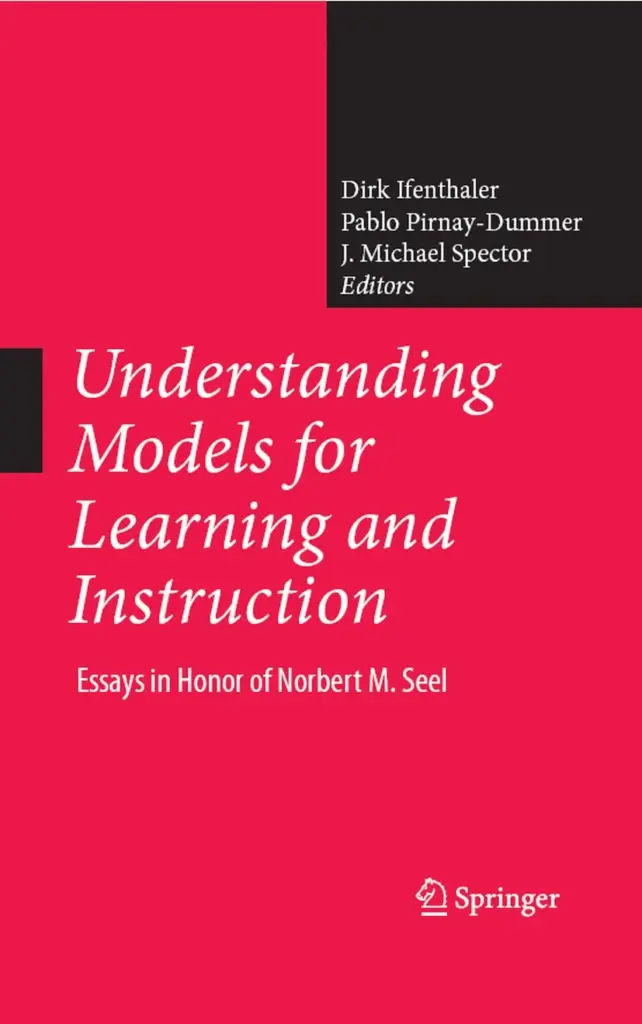
Understanding Models for Learning and Instruction
For more than 25 years, the pioneering research and theories of Norbert Seel have had a profound impact on educational thought in mathematics. In this special tribute, an international panel of researchers present the current state of model-based education: its research, methodology, and technology.
Ifenthaler, D., Pirnay-Dummer, P., & Spector, J. M. (Eds.). (2008). Understanding models for learning and instruction. Essays in honor of Norbert M. Seel. Springer. https://doi.org/10.1007/978-0-387-76898-4